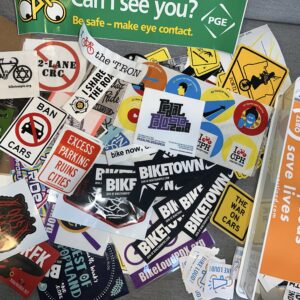[Contributor Michael Andersen is the editor of Portland Afoot, a forthcoming “10-minute newsmagazine” and wiki about low-car life in Portland, especially TriMet riders. Their launch issue comes out June 1.]

(Photo: Michael Andersen)
Three years into a quest to go beyond bike lockers, TriMet is about to build what it hopes will be the next generation of 24-hour bike storage at the Sunset Transit Center in Beaverton.
Yesterday, TriMet bicycle planner Colin Maher told a small crowd at PBOT’s Bicycle Brown Bag discussion that, “Bike lockers are great, if you have one. And that’s the trouble.”
TriMet’s solution, modeled on the Berkeley-based BikeLink system, is to set up a card-based, pay-to-park system for commuters who want to keep their bikes safe without committing to a six-month, $25 locker rental.
“The reason you’re charging for bikes is you’ve got a security system here – you’re paying for that support. If you don’t want to pay, there’s always bike racks outside.”
— Colin Maher, TriMet
This is all part of the regional transit agency’s effort –- kicked off during the 2008 gas price spike – to cut the crush of bikes on rush-hour MAX trains. They’ve almost doubled the number of bike lockers since, but the number of renters hasn’t risen. Last month, TriMet’s Citizen Advisory Committee said the agency should “invest less in park and ride lots and more in bike storage” to free up room on trains, especially for wheelchairs.
Secure bike parking at Sunset Transit Center’s new 75-bike cage, Maher said, will cost 3 cents an hour during the day, 1 cent an hour on nights and weekends. (Yep, that’d be about $2.50 for one week straight.)
The $185,000 project at Sunset TC comes from last year’s federal stimulus act. Construction starts mid-June; it’s supposed to be ready to use in mid-July.
Maher said the daytime rate might rise if the cage gets too crowded, but he expects overnight bike parking to remain inexpensive. “We’d like to use the pricing to encourage people to leave bikes overnight, which is what about 15 percent of bike-locker renters are doing right now,” Maher said.
Riders will pay for use of the cages with a new “smart card” system: Each renter will get a personalized card that checks his or her bike in or out of the facility and tracks the time their vehicle spent inside.

Renters get their cards at an ATM-like machine in the transit center. After that, adding cash to the cards will be fully automated (check these videos from BikeLink for more on how it will work).
Riders don’t have to use the cage if they don’t want to pay – or if they’re annoyed, as city planner Ellen Vanderslice seemed to be during Thursday’s meeting, that the park-and-ride will remain free for cars.
“The reason you’re charging for bikes is you’ve got a security system here – you’re paying for that support,” Maher said. “If you don’t want to pay, there’s always bike racks outside.”
TriMet’s new bike parking cards will also be used in two other new bike-parking facilities: Beaverton Transit Center’s new 100-bike garage and another cage at Gresham Central Transit Center.
Both of those are due to start and finish construction this September, Maher said.
So, is this the future of the suburban park and ride? Could it be the future of the urban parking garage?
Well, it sure is cheap – especially if it convinces a few dozen people who live within a mile or two of the park-and-ride to leave their cars at home. That’s because free auto parking is really, really expensive to taxpayers. The Sunset TC bike cage will replace eight auto spaces with 75 bike spaces, so if it fills up, it’ll have cost just $2,500 per person to build. That’s one-third of the $7,500 the public has to pay for a car-sized space in a parking lot, one-sixth of the $15,000 we pay for a car-sized space in a parking garage.
The catch, of course, will be filling up the bike cage. If 500 Beaverton car users roll past a nearly-empty bike cage while searching for parking spots of their own every morning, they’ll start to clamor to reclaim some of those eight spots.
Maher is confident that easy-pay bike parking is something Washington County wants. “I think the timing is right on this to get it full by the end of the summer,” Maher said. “The bike racks we have right now are full, so we don’t know how much demand is out there.”






Thanks for reading.
BikePortland has served this community with independent community journalism since 2005. We rely on subscriptions from readers like you to survive. Your financial support is vital in keeping this valuable resource alive and well.
Please subscribe today to strengthen and expand our work.
Are they taking out car spaces for the cage? My friend who lives in Beaverton and used to work downtown used to have to park across the freeway from the Sunset TC Park and Ride and then walk across the bridge, because the garage fills up by 7am. Also they can’t expand that garage because they didn’t build the structure so it could handle additional floors. I could could see car drivers getting annoyed if spaces are getting taken away (not that I personally care, but still).
Neat. Lets get this system put in at the airport. Bike parking is pretty decent there already but secure bike parking for ~$2.50/week would be fantastic.
I tried Bike Link’s pay-by-card bike lockers in Vancouver before and wasn’t very motivated to stay committed. If I was going to be leaving my bike somewhere for hours, I enjoyed the extra security; but, not too many places that require me to be away from my bike that long.
I do find it odd that TriMet allowed cars to park for free but will charge bikes. Its like a restaurant giving you a pricey meal for free but charging you for the ten cent after-dinner mint.
A cage? As in, not individual lockers? That would be very cool for me as an Xtracycle rider, because my bike doesn’t fit in the existing lockers and plastic covers. Now if we can just get one at Gateway…
I agree with Ellen Vanderslice… but it seems that TriMet is missing an opportunity to charge for car parking, especially since the garage usually fills up by 7am. The fee would need to be well below what is charged in downtown Portland, but it would be an incentive to use other modes (bikes) to reach the station and create some much needed revenue.
Paul: they are indeed eliminating eight spaces from the garage. Here’s a schematic, if your friend is interested:
http://www.flickr.com/photos/portlandafoot/4625577496/
Matti and Kathleen: Vanderslice suggested at the time that the free car parking at this park-and-ride might be due to federal strings that were attached to the construction of the garage. Dumb, if true! Maher couldn’t confirm this, though.
I think the reason they can charge for bikes to park but not cars is that cars have built-in security that works “most” of the time (locks, alarms, etc.). For the most part, you just simply park it, walk away, and come back some time later to find it right where you left it.
However, with a bike, even when you lock it up, it can be easily stolen when you are gone. Thus there is a financial incentive for a cyclists to pay a little extra to keep their easily-stolen property safe.
I know this has little to do with the *true* cost of providing car parking vs. bike parking, but seems reasonable to me.
This is a big step in the right direction for Trimet.
Better integration of the metro area’s bicycle network with the transit network is long overdue. For far too long, the two systems haven’t worked very well together (except for 2 bikes/bus on the racks).
I think we’ll quickly find that a lot of people who wouldn’t consider riding all the way downtown WILL ride a bike to a relatively nearby MAX station or a park & ride, if they don’t have to ride all the way in with their bike on the train (ie. if there’s a safe place to leave their bike).
I think this may be catalytic in getting A LOT more people “bike commuting” (for at least part of their commute) in the ‘burbs.
Great stuff!
I am very excited to see this project get built. It will set an important precedent for other such facilities around the region and country.
Re: the small charge for using the facility–I know numerous people who have had their cars broken into in the “free” garage. My personal opinion is that if $2.50 per week will put my bike under lock and key with closed circuit security cameras, I’ll gladly pay the fee.
I’m also interested to see how well the cargo bike spaces are utilized. Many cargo bikes do not fit in the current lockers and are too large to bring on the trains.
The set up described seems very similar to the Bikelink accessible BART cage at the Embarcadero Station.
I assume bike riders will be able to use their Bikelink card in either Beaverton or Vancouver (note 1 bike parked per card) – at the edge of Trimet’s system.
It would be nice to have some of these lockers at the Expo Station…some day.
Yes sadly it is a common model that drivers who park at transit station park for free. And most transit agencies do not get ridership demand credit for bike parking only car parking spaces (this was driving us crazy during the planning for the CRC parking facilities in Vancouver).
I was amazed when I learned that at the Tacoma Done P+R bicyclists had to leave a $100 key deposit for lockers and drivers parked for free (4 years ago).
This is really awesome. I’ve used the Sunset TC for years and have opted not to leave my bike parked there long term or over night because it seems like the most awesome place to score a free bike.
Now that this is becoming a problem of the past, the worst part of accessing the STC will be the annoying hill climb from the strip mall up to the station. it would be so sweet to have a nice, gradual hill instead of the steep one that currently exists.
Beaverton doesn’t get it. Paid bike parking? Really? Screw that, I’d boycott it on GP.
“If 500 Beaverton car users roll past a nearly-empty bike cage while searching for parking spots of their own every morning, they’ll start to clamor to reclaim some of those eight spots.”
Grimly funny and probably true. The funny part is the sheer stubbornness of this hypothetical someone who might happen upon such a situation (no space left for cars) but would somehow not register “plenty of room in the bike cage” as a huge OPPORTUNITY.
I suspect this same mentality is prevalent when, for example, people are stuck 30 cars deep in fully stopped traffic and I just roll right past all of them on the right. I used to think they were seeing me and saying “Wow maybe I should get a bike” but now I think it’s probably just this same tragic failure to register the magnitude of the opportunity. Such is the power someone’s set ways have over them I guess.
In this case though, TriMet is actively removing said “opportunity” big-time, by charging to park your bike. It’s true that the cars don’t need any ADDITIONAL security, but what about the significant costs TriMet has incurred in providing a facility for them in the first place? There’s the gigantic reinforced concrete monolith (i.e. parking garage), all the construction costs, all the engineering that went into it, all the land that had to be permitted, prepped, and made unavailable for other (in my opinion more worth) purposes, to build it. Bikes wouldn’t even need all that. But it’s all essentially a freebie, while a small steel structure and a few locks have to be extracted nickel-and-dime from the users for some reason. Oh and also add to that, the costs of administering the payment method itself!
“worthy” not “worth”
i have lived here forever, and I have yet to understand (nor care) about the bike parking boxes. Now that we have capacity issues on trains and buses, it would behoove TriMet to roll out a educational campaign about about the boxes, and start some automated POS terminals. it must be intuitive and quick. people do not want to have to figure this stuff out!
#AK, true that there is probably more perceived value to secure bike parking than the car parking. Still, I think that the High Cost of Free Parking should be a mandatory read in order to get a driver’s license. Even if we don’t get rid of it, drivers should at least know what a subsidy they are getting.
Something like this would be nice at PDX…
I’ve been involved in some of the meetings and bike issues surrounding the next MAX line (Portland to Milwaukie- expected completion, early 2015) and they are talking about similar cages at certain stations along that alignment. I think it’s a great idea.
I think that charging autos to park, even just .25 or .50 a day, would be a good idea and might encourage some drivers who park move to bikes.
While free secure bike parking could convince more people to ride, it could also result in a big storage problem. Some would just leave the bike there indefinitly, reducing the parking for other riders.
A small payment may be the best solution for that, unfair as it is in comparison to all the free car parking.
Having been at the meeting, and having heard Maher get peppered with questions for sixty minutes, this sounds to me like a very well thought out idea.
The very, very small fee covers a modern security system with access cards, cameras & remote support. Though some may gripe drivers getting anything for free when we already live in a motorist welfare state, remember that the whole point of a park-and-ride is to get drivers out of cars and on to transit.
Really it should be seen that for every bike parked there, it is one less car taking up a valuable parking spot. So technically as long as 8 bikes are parked in the new facility it is coming out even. Maybe a sign needs to be put up that says “One Less Car in a Parking Spot” next to the facility.
I haven’t ever noticed bikes taking up spaces for wheelchairs though. Wheelchairs have their own designated spots on the trains and if a person with a bike happens to be using a wheelchair spot, I’ve never seen them not yield to a wheelchair. That comment just seemed odd to me. Make more room for people, strollers, luggage sure…
We would have used this type of facility at Sunset TC regularly not too long ago but for various reasons won’t have a lot of need for it starting this fall.
“Really it should be seen that for every bike parked there, it is one less car taking up a valuable parking spot.”
Really? Looks like they’re taking up one *more* parking spot that I could otherwise put my bike.
It’s a good idea, but I wonder if it will yield the hoped-for result. Most cyclists I see on the max coming from WA county are not headed downtown. They need, like myself, a bike to actually get to/from work from max and to get around after work if wanting to do anything in pdx. The closest bus stop to my work is a fast 10 min walk, and adding that walk plus the bus adds a minimum of 25 minutes to my commute. No way. I’m taking my bike on max all the way. I do hope, though, that the bike cages will encourage downtown workers to use max. Don’t the parking structures have security cameras? They tend to be well lit, too. That’s added security that car drivers are not paying for, directly.
I hate how downtown garages charge for bicycle parking when their idea of facilities for cyclists are a poorly located, well-concealed and overcrowded MUNI style rack instead of bike staples near the attendants…
I think the biggest question is less about the facilities and pricing themselves (seems like a great idea to me!) but rather the location. Sunset TC is located on top of a rather large hill, farther than a quarter to half a mile from the area’s suburban residential development, and is pretty difficult to access without biking on some major roads with lots of fast-flying SUVs.
http://www.google.com/maps?f=q&source=s_q&hl=en&geocode=&q=sunset+transit+center&sll=44.946304,-93.169304&sspn=0.008262,0.01929&ie=UTF8&hq=sunset+transit+center&hnear=&radius=15000&ll=45.510269,-122.78169&spn=0.00818,0.01929&t=f&z=16&ecpose=45.51384109,-122.78444833,1123.64,151.586,24.35,0&lci=bike
Someday, Metro and whoever owns those fields around it will make a killing on some excellent Transit Oriented Development near a major light rail stop that’s literally two stops/ten minutes away from downtown Portland while being away from the city’s taxes and whatever else compels people to live in Beaverton.
I guess I’m digressing from the original topic; I just want to say that while I applaud these efforts, and perhaps they know what they’re doing a lot more than an armchair urban planner such as myself, I’d imagine that investing in these facilities at Beaverton TC, Gateway, Hollywood or anywhere on Interstate (where the concern for crime, I hate to admit, is higher) might reap higher returns.
and to add to my comment, after rereading what’s previously been discussed: the movement to reframe Sunset TC and others from “park and ride” to “bike and ride” is a fantastic idea, one that really holds a lot of promise for modeshare. I remember seeing a map of the greater DC area, superimposed by the Metro stations in suburban Maryland and Virgina with one and two mile buffers around the stops; it covered a surprisingly large part of the region that otherwise was driving to use the metro into the city. Those $100m investments in transit could be so much more effective at reducing modeshift with $1m investments retrofitting the Sunset Transit Centers of the world with these sort of facilities. As transit stations get built as spokes from downtown areas to suburbs (the general trend in cities across much of the country) spending that extra marginal investment in cyclepaths, bike lanes and traffic calming is crucial.
The question to me then becomes, who will fight for these suburban bike and rides? Out here in the Twin Cities, even convincing nearby St Paul to link bike routes to Minneapolis’ facilities have been excruciatingly difficult, and its only tougher for activists to stand up against suburban municipalities’ plans for an autocentric transportation system. You’ve previously highlighted some of the people working to make Beaverton and other areas more bike-friendly, but as someone who grew up outside of Portland, I can assure you that getting some of those cars off of the streets in downtown Portland will require finding ways to fix the gaps in biking and transit that exist beyond the control of Sam and PBOT.